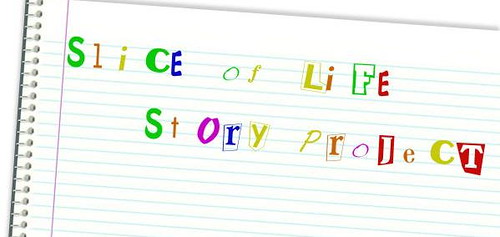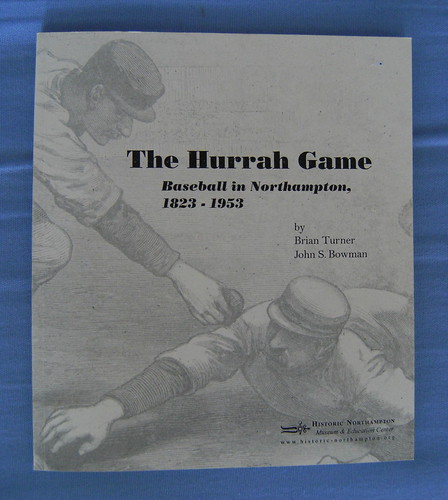
(This is part of the Slice of Life Project)
Today, my slice focuses in on my writing.
Since November, when I was inspired while traveling home on a train from the annual meeting of the National Writing Project with a laptop open on my lap, I have been periodically writing some quickfiction stories (also known as flashfiction in some circles). I love the genre because it all about what you don’t write and what you don’t tell, and there is the challenge of developing a character in as little of time and space as can possibly be. I’m sure there are rules to the genre that I am dutifully and openly ignoring.
Some stories in my series have been stronger than others, and I mostly write them during freewriting moments in my classroom. An idea sparks the writing, and as my students write, so do I. I have not shared these with my students, however. Someday, I intend to go back and do some editing and revision and then see what remains. For the most part, these are rough quickfiction stories. But I like them a lot. (You can view the rest of the quickfiction here) I also realized that quickfiction lends itself to podcasting and so I have included the reading of my stories, too.
Here, then, are the four latest stories:
Winner
It seemed an odd place to leave an egg. Out here, in the middle of nowhere. How many people had come this way, I could not tell. There was not path, not even the wayward trails left behind by animals. The river was far enough away that it would attract more people than this little alcove of pine trees. The sunlight was filtered out almost completely. I had expected nothing but solitude and yet, there, hidden among the stones at the base of the largest pine tree, was a colored plastic egg. Purple with pink stripes. The discovery had stopped me dead in my tracks. Now, I inched forward, my eyes scanning the world for some signs of something. A voyeur with a video camera. perhaps? A child at play? Nope. Nothing. I kicked at the plastic item gingerly with my boot, as if expecting the egg to explode. It moved, shifted and then did a wiggling roll off the rocks and stopped near my foot. I reached down and picked it up. The egg was not empty. I shook it. Something was inside. Again, I looked around to see if I were being played for the fool. No. I was alone. The egg twisted slowly in my hands, and the halves released their grip. Inside was a plastic baggie. My first thought was that I had uncovered a drug run of some sort. A cache of cocaine or pot. Walking away would be the wisest thing to do. Yet, I had come this far and could not resist my curiosity. The bag opened up and a note dropped to the ground. I bent down and saw the thin outline of faded handwriting. I unfolded the paper and read: “Congratulations! You are a winner!” and that was it. Nothing about what I won or why I was winning or what to do to claim my prize. I carefully put the paper into the bag, and then the bag into the egg, and then twisted the egg closed. Holding the object in my fist, I scrambled east for about a quarter of a mile, deeper in the woods than ever before, and there, I found a hollow tree. I left the egg there and made my way home, a winner.
Headless
The head came off as soon as the body slammed down the bottom of the stairs. The head rolled against the wall, careened across the floor and settled into the dust beneath the couch. Sam came barreling down the stairs, unaware that the head was gone. He picked up the GI Joe that was sprawled in an unhuman-like position near the last step — one leg this way and the other leg, that way, and the arms behind the back — and he ran his fingers along the neck. No head. Sam glanced around, making sure his grandmother was nowhere near. GI Joe had been a gift, just 15 minutes ago, and now, the head was gone. He didn’t want to deal with her anger. Again, he rolled his fingers over the nub where the head had been. Then Sam got down on his hands and knees to look for the missing appendage. He found other lost treasures — a moldy jelly bean, a paper clip, an old credit card. But no head. He could feel tears starting to well up inside him, and it made him embarrassed that he would be so sad over a doll. He heard a sound. Sam looked around. The sound seemed to be coming from underneath the couch. It sounded like a head, rolling. Sam got a bit scared. Ghosts and spirits scared him. He knew they were real. Maybe the ghost of GI Joe was mad at him. Maybe the head was coming back to life. He heard his grandmother in the kitchen. He had to move fast. Sam slowly approached the couch. The sound got louder. He got more frightened. Footsteps. His grandmother. Sam lifted up the fabric covering of the couch and the head of GI Joe came rolling out at him. He jumped back. His grandmother called his name, spurring him to reach out and take the head in his hands. In an instant, he had popped the head of GI Joe back onto the nub of the neck. His grandmother came into the room but ignored Sam completely. Instead, she was scolding her cat, Scout, who had emerged from the other end of the couch in a catnip-inspired panic and was tearing his claws into the side of the cushion. Sam looked at GI Joe right in the eye and smiled.
Blood
Blood on your hands is an odd sensation. The color strikes you first — the coating of red drippings. Your first instinct is to avoid the splatter but it is unavoidable. Ask any police detective with a DNA kit. Blood goes where blood wants to go. Kimball stared at his hands with these thoughts in his head, frozen by the sight. It occurred to him that this had happened before, in some freeze-frame memory from the past — his brother, perhaps, and the hunting knife accident. The bone coming up through the finger. Then, as now, things unfolded quick even as time slowed to a crawl. The blood kept dripping. Now, too, he could smell it. Iron or some metals. Something in the blood that seemed not quite right. Kimball felt the blade drop to the ground. His mind was turning black but he heard her voice cutting through the fog. “My god, Kimball, what ….” before everything faded to dark.
Performance
If they had asked her, she would have declined. She would not have willingly accepted this mantle nor this well-lit space on the stage — doused in floodlights and a thousand eyes on her every move — if she had had a choice. She opened her mouth to speak. Nothing emerged but her silence, and this silence glued her to her spot. The conductor raised his arms, baton dancing in his fingers. All around her, instruments moved, shifted, ready for the moment of life. She, however, remained still. If they had asked her, she would not be here. She could see the outline of her father and aunt, seated a few rows back. She felt caught in a net. The conductor moved and a musical explosion erupted around her. She noticed the violin now on her shoulder. The bow was balanced perfectly in her fingers. The conductor’s eyes now shifted to her. If they had asked her, she would not be at this place at this time. He nodded. So she played, imagining all of her notes like broken bones scattered on the stage. The violence of her sound was the only sweet revenge she could think of. For, of course, they had not ever asked her, nor would they ever.
Peace (in shorter stories),
Kevin







 We are giving her a crash course in our originals because we have a gig coming up in just a few weeks. This is a show being put on by the man who recorded our band for much of last year. We are the headliners of the show and, to be honest, we are still trying to find our new sound, following the decision by our keyboardist-singer to leave and pursue some solo recording. I am now playing keyboards on some songs, along with sax and guitar, and it all feels a bit uncertain. However, the other night, something started to click and come together in a nice way. I think we will be fine.
We are giving her a crash course in our originals because we have a gig coming up in just a few weeks. This is a show being put on by the man who recorded our band for much of last year. We are the headliners of the show and, to be honest, we are still trying to find our new sound, following the decision by our keyboardist-singer to leave and pursue some solo recording. I am now playing keyboards on some songs, along with sax and guitar, and it all feels a bit uncertain. However, the other night, something started to click and come together in a nice way. I think we will be fine.